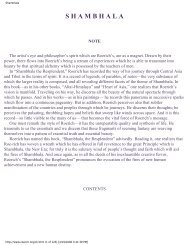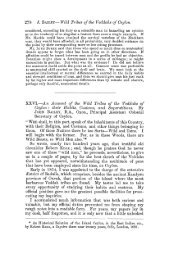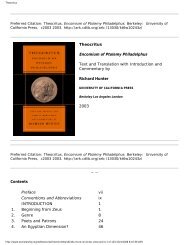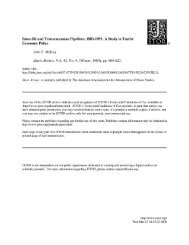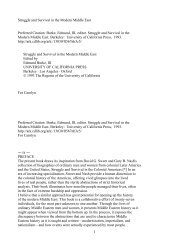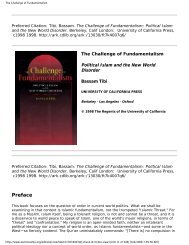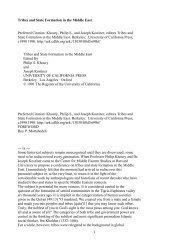Between Two Worlds Kafadar.pdf
Between Two Worlds Kafadar.pdf
Between Two Worlds Kafadar.pdf
You also want an ePaper? Increase the reach of your titles
YUMPU automatically turns print PDFs into web optimized ePapers that Google loves.
Ottoman historical writing of the fifteenth century can be neither taken for<br />
granted nor dismissed in terms of its relevance for understanding the historical<br />
reality of the earlier century; a critical reading based on systematic suspicion<br />
can uncover significant truths underneath the seeming distortions. The problem<br />
is a wholesale, undifferentiated characterization of the Ottoman chronicles.<br />
Different versions need to be understood on their own terms; without looking for<br />
a one-to-one-correspondence between textual variations and ideological<br />
orientations, one can still search for patterns identifying distinct traditions<br />
before determining their value.<br />
A good example of systematic doubt is shown by Lindner himself when he deals<br />
with the way Osman came to power. On the basis of a<br />
― 104 ―<br />
comparison of different Ottoman sources, he concludes that Osman was elected to<br />
office in keeping with tribal traditions, which is crucial to his theory. Why,<br />
then, dismiss other traditions without reasoned argument? He asserts, for<br />
instance, that the story concerning the institution of the market tax (bac ) for<br />
the first time upon Osman's capture of Karacahisar is "anachronistic" without<br />
any argument. There does not seem to be any obvious reason to dismiss this<br />
tradition offhand, deriving from Yahsi Fakih in all likelihood, other than the<br />
fact that Lindner wants to attribute any ulema influence on the Ottoman polity<br />
to a later period. Particularly if one were to accept Lindner's own argument<br />
that the Ottomans captured Karacahisar from the Germiyanids and not from the<br />
Byzantines, it is reasonable to assume that Osman was merely faced with the<br />
continuation of a local tax. If the Germiyanid rulers of Karacahisar exacted bac<br />
, the same source of income would naturally be offered to the city's new ruler.<br />
Several other traditions about the capture of Karacahisar provide further<br />
evidence for Lindner's argument that that city was taken not from the infidels<br />
but from the Germiyanids. It is there that Osman is suddenly bombarded with<br />
choices he has to make in relation to established Islamic administrative<br />
practices as opposed to the loose conditions of the ucat . It is in Karacahisar,<br />
we read in the YF-Apz narrative, that the hutbe (Friday sermon) was read for the<br />
first time in Osman's name, that a kadi (judge) and a subasi (police prefect)<br />
were appointed, and that bac was applied, upon the demand of those who came from<br />
"Germiyan and other provinces."[119] Whether all this indeed happened in<br />
Karacahisar cannot be ascertained, but after capturing a few towns like it,<br />
Osman was probably approached by several sheikhs, fakihs , kadis, priests, and<br />
scribes who confronted him with such matters and offered their services.<br />
Many other examples can be cited of scholars systematically analyzing specific<br />
historical traditions in the fifteenth-century chronicles and delineating<br />
meaningful patterns that have some bearing on early Ottoman realities and/or<br />
ideological developments. In addition to Wittek's study of the Aydos castle<br />
legend and Inalcik's analyses of the chroniclers' criticisms of Mehmed II's<br />
policy after the conquest of Constantinople, one can note Irène<br />
Beldiceanu-Steinherr's treatment of the first conquests in Thrace, to be<br />
discussed below. Ménage's comparison of the different versions of the "dream"<br />
that led to the foundation of the state in Ottoman legend, Zachariadou's<br />
93




